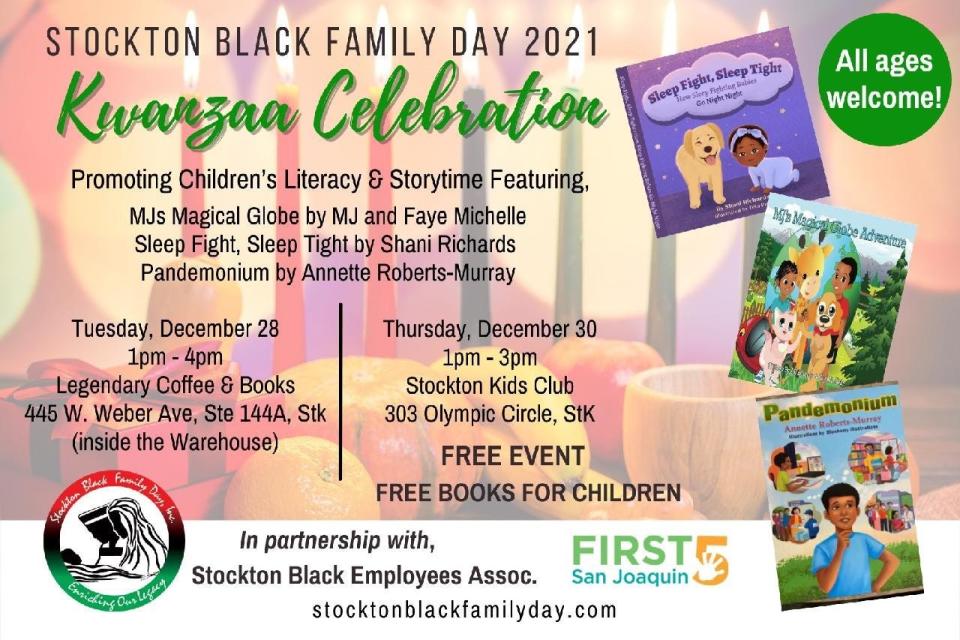What is Kwanzaa? How the holiday was created and where to celebrate in Stockton
With Thanksgiving passed and preparations for the next round of holidays in full swing, how can you participate in celebrating with the community? What other holidays are celebrated locally in addition to Christmas?
Given the diverse community in Stockton, Kwanzaa is one of the many celebrations observed. Millions of African descent individuals celebrate in the United States and across the world from Dec. 26 to Jan. 1.
How did this cultural celebration come to be? And how is it celebrated? Here are the details:
What is Kwanzaa?
Kwanzaa is a Swahili word that means "first" and signifies the first fruits of the harvest, stated the Smithsonian Anacostia Community Museum (ACM), located in Anacostia, one of the oldest neighborhoods with abundant African American history in Washington D.C. The museum opened in 1967 as an outreach effort by the Smithsonian to the local African American community.
Since then, the ACM “documents and preserves communities’ memories, struggles, and successes, and offers a platform where diverse voices and cultures can be heard.”
“In Africa, there are many customs that are common among the various ethnic groups found on the continent. One of these is the celebration of the harvest,” the ACM documented. In 1966, Maulana Ron Karenga and the U.S. Organization adopted the basic principles of the harvest celebrations in Africa to create the observance of Kwanzaa.
Maulana Ron Karenga is an activist, Africana studies professor and author credited for the creation of Kwanzaa. He is now the department chair and advisor for the department of Africana Studies at California State University, Long Beach.
Karenga recognized African Americans do not live in fully agricultural settings like some communities and their ancestors did in Africa, yet “he sought to emphasize that the basic principles found in producing the harvest are vital to building and maintaining strong and wholesome communities,” the ACM reported.
By doing so, Kwanzaa was developed as a time when communities reflect on these harvest-producing principles, share and enjoy the fruits of their labor, and recommit themselves to the collective achievement of a better life for their family, community, and people.
How is Kwanzaa celebrated?
“Kwanzaa is a time of learning, family and celebration,” stated the National Museum of African American History and Culture. Each family and/or community might have slight variations on specifics of their celebrations, but generally people who celebrate “come together to share a feast, to honor the ancestors, affirm the bonds between them, and to celebrate African and African American culture,” the museum documented.
Each day a candle is lit to highlight the principle of that day and “to breathe meaning into the principles with various activities, such as reciting the sayings or writings of great black thinkers and writers, reciting original poetry, African drumming, and sharing a meal of African diaspora-inspired foods,” the museum reported.
The seven principles are Umoja (unity), Kujichagulia (self-determination), Ujima (collective work and responsibility), Ujamaa (cooperative economics), Nia (purpose), Kuumba (creativity), Imani (faith).
Essential symbols of Kwanzaa — placed at a table or around a home — include the Kinara (candle holder), Mkeka (mat), Muhindi (corn to represent the children), Mazao (fruit to represent the harvest), and Zawadi (gifts).
The colors of the Pan-African flag are traditionally used throughout spaces, decorations and clothes; red to represent the struggle, black to represent the people, and green to represent the future.
The museum posted a list of texts, materials and reflections under each principle as the celebratory week goes by. For more details on these, they can be found at nmaahc.si.edu/blog-post/seven-principles-kwanzaa.
Where to celebrate Kwanzaa?
On Jan. 1 — at the end of Kwanzaa — the Stockton Black Leadership Council traditionally hosts their annual Freedom Day Parade to commemorate the signing of Emancipation Proclamation on Jan. 1, 1863. The proclamation signed by then-president Abraham Lincoln declared all persons held as slaves shall be free.

Due to the ongoing COVID-19 pandemic, the council's founding president and former Stockton city councilman Ralph White said the parade was called off as a precaution and preventative measure against the virus. He said expects for the parade to be held again the next holiday season on Jan. 1, 2023.
For those wanting to celebrate with kids among community, Stockton Black Family Day partnered with First 5 San Joaquin and the Stockton Black Employees Association for this year’s Kwanzaa Celebrations, hosted on Tuesday and Thursday, Dec. 28 and 30. Both days’ celebrations aim to promote children’s literacy with storytelling and family activities.
On Tuesday, Dec. 28, the community is invited to gather from 1-4 p.m. at Legendary Coffee & Books inside the Waterfront Warehouse at 445 W. Weber Ave. in Stockton.
Later that week, the community is invited to gather again on Thursday, Dec. 30, from 1-3 p.m. at the Stockton Kids Club at 303 Olympic Circle.
Know of other Kwanzaa celebrations this season? Let us know at metroeds@recordnet.com.
Record reporter Laura Diaz covers social justice and societal issues. She can be reached at ldiaz@recordnet.com or on Twitter @laurasdiaz_. Support local news, subscribe to The Stockton Record at recordnet.com/subscribenow.
This article originally appeared on The Record: What is Kwanzaa? How the holiday was created, celebrations in Stockton

